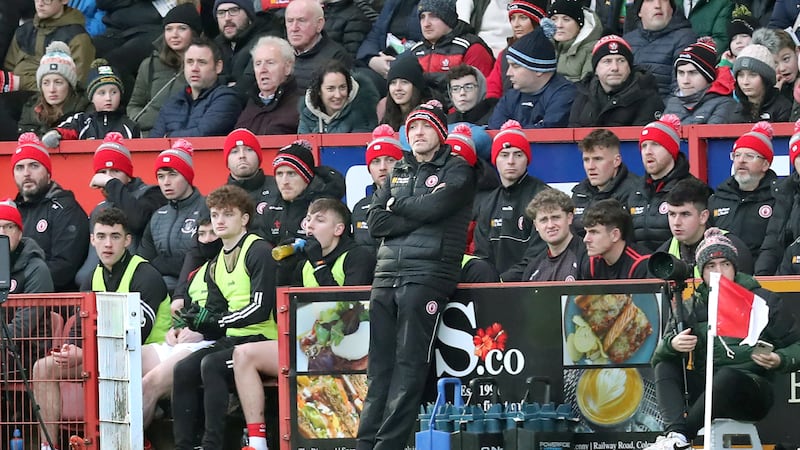DUNGIVEN manager Kevin Madden does not agree that his team "threw the game away" when they surrendered a seven-point lead to Slaughtneil in the Derry semi-final.
The former Antrim star takes a different slant on the contest which ended in a draw.
"People might think that Dungiven were seven up at half-time and threw the game away," said Madden.
"But Slaughtneil levelled the game and went a point up with eight or nine minutes to go.
"Slaughtneil had the wind on their backs and they had all the momentum but that is when we held firm.
"Whenever the game came down to the wire, it was us that was pushing for the winner at the very end. A draw was probably a fair result on the day. It just sets it up nicely for the next day."
After seizing an early grip of the game in the first half, Madden said it was inevitable that a team of Slaughtneil's strength and experience was going to make a comeback.
"It was the proverbial game of two halves. We started the game well and we got two quick-fire goals. We played some very effective football in the first half. Slaughtneil regrouped at half-time. A team of the toughness and calibre of Slaughtneil was always going to have a purple patch. It was up to us to weather that purple patch," said Madden.
Although his team failed to stymie Slaughtneil's scoring burst, Madden's main criticism of his team centred on another aspect of their performance.
"We realise that 2-6 isn't going to win many championship matches. When we looked at the second half, Slaughtneil rattled a lot of scores in quick succession but we didn't keep the scoreboard ticking over. To score one point in the second half and to expect to win a game of championship football is not realistic. We need to keep the scoreboard ticking over and we need to break the momentum of the opposition by making sure that they don't dominate for long periods like they did in the drawn game."
Still in his first year with the north Derry club, Madden has been forced to rebuild the team. Eight players from last year's starting line-up are not involved this season. The absentees included key men who occupied central positions.
Full-back Gavin 'Pinny' McLaughlin, centre half-back Paddy Kelly, and midfielder Aaron McCloskey were on a side that also featured Liam Hinphey, Kevin Hinphey, Cathal McKeever, Kevin Boyle and Fergal McGuigan.
Forced into a major redevelopment job, Madden's new-look team features a total of nine players who are under 22-years-old. Despite their youth and inexperience, the Dungiven boss felt his young charges held their own against a battle-hardened Slaughtneil side.
"Slaughtneil have been renowned for their strength and their physicality in the tackle over the last number of years. But that is not an area we are worried about.
"I didn't feel we came up short in that regard the last day. We are quite robust and we are quite physical in the tackle ourselves. Physically, I don't think there is a lot between the teams," he said.
Having watched and admired Dungiven from afar, Madden was always convinced that the St Canice's club wasn't fulfilling its potential.
"Dungiven has always been a club that has produced good players," he said. "But they haven't always transferred that success to senior level.
"That was one of the things which attracted me to the job. Here was a team and a club that had raw, untapped potential but it was a club that maybe wasn't doing the right things when it came to senior level."
Madden is convinced that the progress made in recent seasons will soon bear fruit.
"Traditionally, Dungiven do not have a reputation for making the same type of sacrifices as the likes of Ballinderry. That didn't just change this year. That change was being made over the last few years. From the current team, there is a core group of players that have a few years of conditioning behind them. That just didn't happen whenever I came into the job.
"But it runs deeper than that. It's about the ethos of what teamwork represents and what sacrifice represents.
"It's okay players having ideals and buying into a certain culture, but the manager has to implement it.
"In a sense, that is what we have tried to do. We have tried to change the way that people think and they way people act. In doing that, we have had to be very consistent in how that process has been implemented."

